The Contemporary Hospitality Industry: A Comprehensive Analysis
VerifiedAdded on 2023/01/11
|9
|2490
|51
Report
AI Summary
This report provides a detailed analysis of the contemporary hospitality industry, focusing on Marriott International as a case study. It begins by investigating various types of businesses within the industry, including accommodation, restaurants, and entertainment venues. The report then delves into the operational and functional departments of Marriott International, such as housekeeping, front office, HR, and finance, highlighting their roles and interdependencies. Furthermore, it examines the contribution of the hospitality industry to international, national, and local economies, emphasizing its role as a significant employer and revenue generator. The report also identifies different operational roles within the hospitality sector, such as front desk officers, housekeepers, and kitchen staff, and outlines the skills necessary for success in these roles, including language proficiency, communication, teamwork, and flexibility. The report concludes with a discussion of the industry's current trends and provides an overall assessment of the contemporary hospitality landscape.
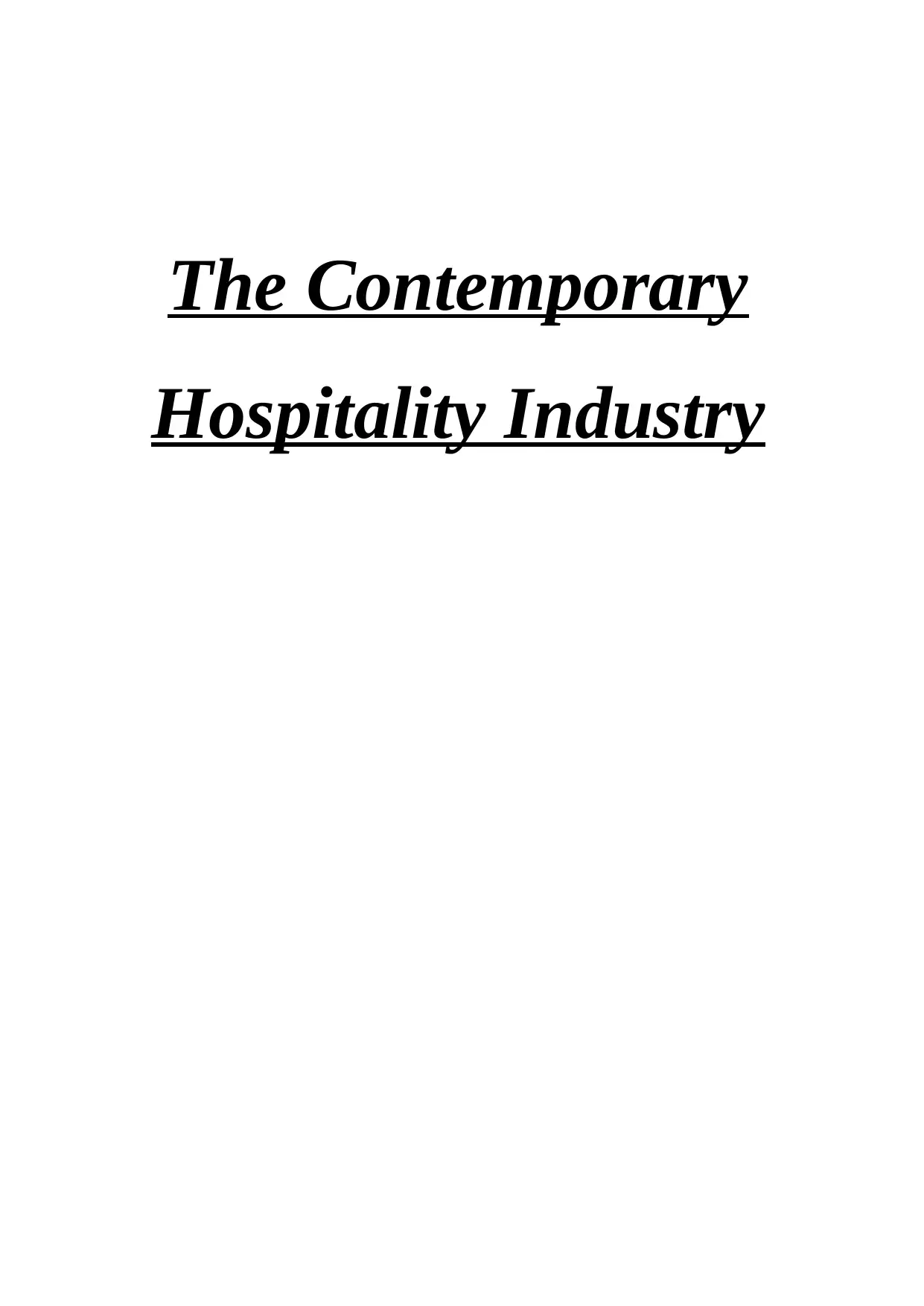
The Contemporary
Hospitality Industry
Hospitality Industry
Paraphrase This Document
Need a fresh take? Get an instant paraphrase of this document with our AI Paraphraser
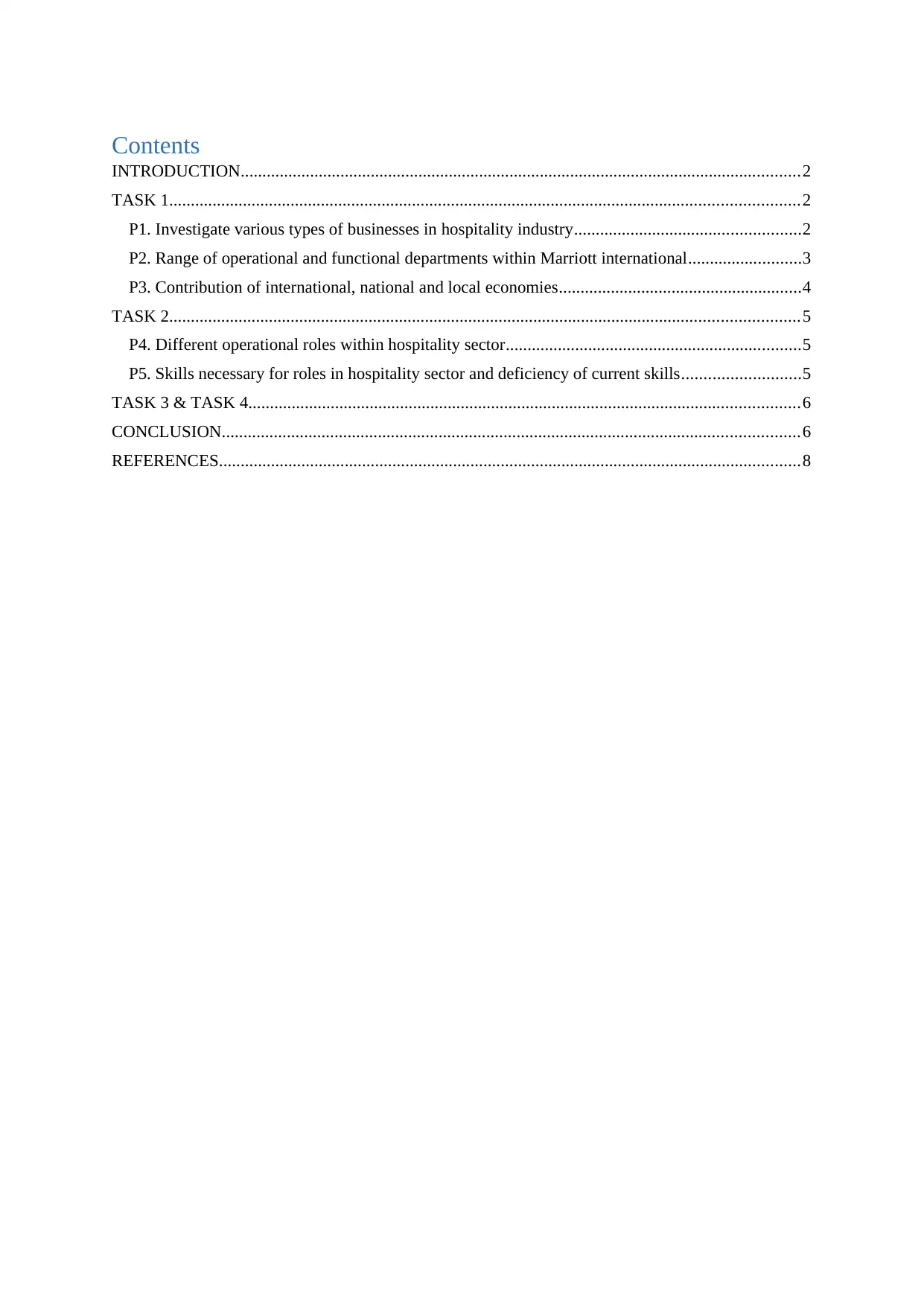
Contents
INTRODUCTION.................................................................................................................................2
TASK 1.................................................................................................................................................2
P1. Investigate various types of businesses in hospitality industry....................................................2
P2. Range of operational and functional departments within Marriott international..........................3
P3. Contribution of international, national and local economies........................................................4
TASK 2.................................................................................................................................................5
P4. Different operational roles within hospitality sector....................................................................5
P5. Skills necessary for roles in hospitality sector and deficiency of current skills...........................5
TASK 3 & TASK 4...............................................................................................................................6
CONCLUSION.....................................................................................................................................6
REFERENCES......................................................................................................................................8
INTRODUCTION.................................................................................................................................2
TASK 1.................................................................................................................................................2
P1. Investigate various types of businesses in hospitality industry....................................................2
P2. Range of operational and functional departments within Marriott international..........................3
P3. Contribution of international, national and local economies........................................................4
TASK 2.................................................................................................................................................5
P4. Different operational roles within hospitality sector....................................................................5
P5. Skills necessary for roles in hospitality sector and deficiency of current skills...........................5
TASK 3 & TASK 4...............................................................................................................................6
CONCLUSION.....................................................................................................................................6
REFERENCES......................................................................................................................................8
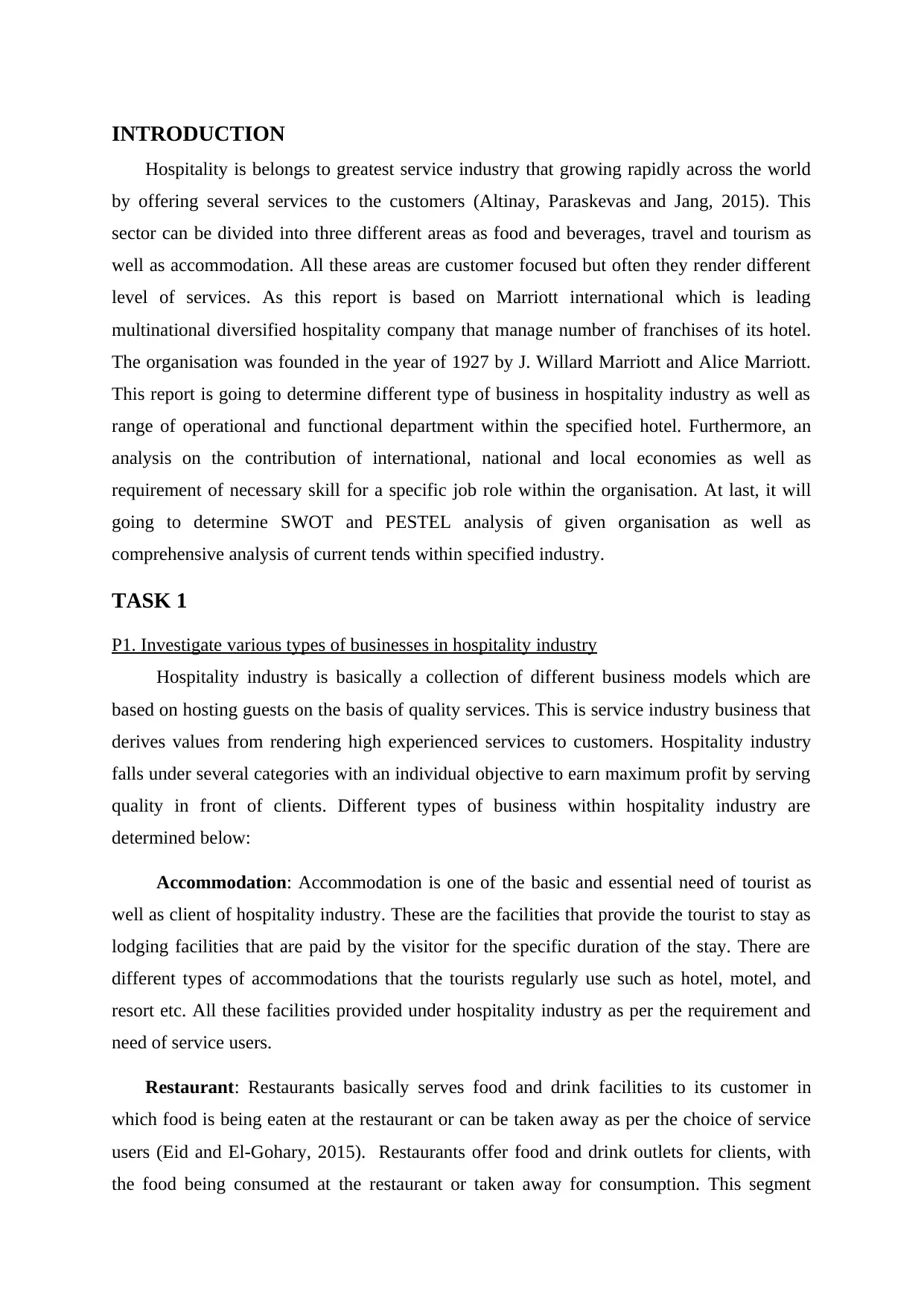
INTRODUCTION
Hospitality is belongs to greatest service industry that growing rapidly across the world
by offering several services to the customers (Altinay, Paraskevas and Jang, 2015). This
sector can be divided into three different areas as food and beverages, travel and tourism as
well as accommodation. All these areas are customer focused but often they render different
level of services. As this report is based on Marriott international which is leading
multinational diversified hospitality company that manage number of franchises of its hotel.
The organisation was founded in the year of 1927 by J. Willard Marriott and Alice Marriott.
This report is going to determine different type of business in hospitality industry as well as
range of operational and functional department within the specified hotel. Furthermore, an
analysis on the contribution of international, national and local economies as well as
requirement of necessary skill for a specific job role within the organisation. At last, it will
going to determine SWOT and PESTEL analysis of given organisation as well as
comprehensive analysis of current tends within specified industry.
TASK 1
P1. Investigate various types of businesses in hospitality industry
Hospitality industry is basically a collection of different business models which are
based on hosting guests on the basis of quality services. This is service industry business that
derives values from rendering high experienced services to customers. Hospitality industry
falls under several categories with an individual objective to earn maximum profit by serving
quality in front of clients. Different types of business within hospitality industry are
determined below:
Accommodation: Accommodation is one of the basic and essential need of tourist as
well as client of hospitality industry. These are the facilities that provide the tourist to stay as
lodging facilities that are paid by the visitor for the specific duration of the stay. There are
different types of accommodations that the tourists regularly use such as hotel, motel, and
resort etc. All these facilities provided under hospitality industry as per the requirement and
need of service users.
Restaurant: Restaurants basically serves food and drink facilities to its customer in
which food is being eaten at the restaurant or can be taken away as per the choice of service
users (Eid and El-Gohary, 2015). Restaurants offer food and drink outlets for clients, with
the food being consumed at the restaurant or taken away for consumption. This segment
Hospitality is belongs to greatest service industry that growing rapidly across the world
by offering several services to the customers (Altinay, Paraskevas and Jang, 2015). This
sector can be divided into three different areas as food and beverages, travel and tourism as
well as accommodation. All these areas are customer focused but often they render different
level of services. As this report is based on Marriott international which is leading
multinational diversified hospitality company that manage number of franchises of its hotel.
The organisation was founded in the year of 1927 by J. Willard Marriott and Alice Marriott.
This report is going to determine different type of business in hospitality industry as well as
range of operational and functional department within the specified hotel. Furthermore, an
analysis on the contribution of international, national and local economies as well as
requirement of necessary skill for a specific job role within the organisation. At last, it will
going to determine SWOT and PESTEL analysis of given organisation as well as
comprehensive analysis of current tends within specified industry.
TASK 1
P1. Investigate various types of businesses in hospitality industry
Hospitality industry is basically a collection of different business models which are
based on hosting guests on the basis of quality services. This is service industry business that
derives values from rendering high experienced services to customers. Hospitality industry
falls under several categories with an individual objective to earn maximum profit by serving
quality in front of clients. Different types of business within hospitality industry are
determined below:
Accommodation: Accommodation is one of the basic and essential need of tourist as
well as client of hospitality industry. These are the facilities that provide the tourist to stay as
lodging facilities that are paid by the visitor for the specific duration of the stay. There are
different types of accommodations that the tourists regularly use such as hotel, motel, and
resort etc. All these facilities provided under hospitality industry as per the requirement and
need of service users.
Restaurant: Restaurants basically serves food and drink facilities to its customer in
which food is being eaten at the restaurant or can be taken away as per the choice of service
users (Eid and El-Gohary, 2015). Restaurants offer food and drink outlets for clients, with
the food being consumed at the restaurant or taken away for consumption. This segment
⊘ This is a preview!⊘
Do you want full access?
Subscribe today to unlock all pages.

Trusted by 1+ million students worldwide
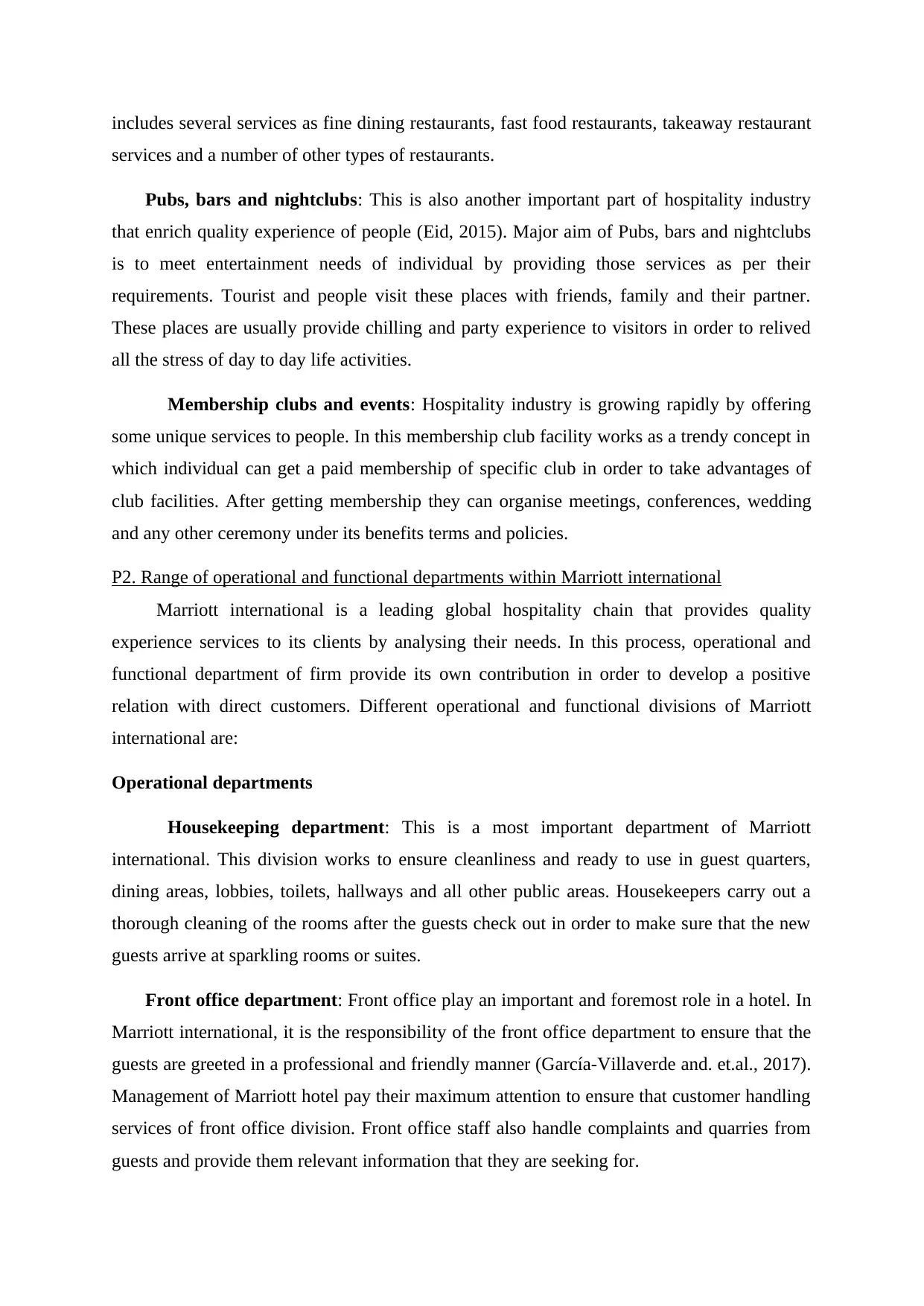
includes several services as fine dining restaurants, fast food restaurants, takeaway restaurant
services and a number of other types of restaurants.
Pubs, bars and nightclubs: This is also another important part of hospitality industry
that enrich quality experience of people (Eid, 2015). Major aim of Pubs, bars and nightclubs
is to meet entertainment needs of individual by providing those services as per their
requirements. Tourist and people visit these places with friends, family and their partner.
These places are usually provide chilling and party experience to visitors in order to relived
all the stress of day to day life activities.
Membership clubs and events: Hospitality industry is growing rapidly by offering
some unique services to people. In this membership club facility works as a trendy concept in
which individual can get a paid membership of specific club in order to take advantages of
club facilities. After getting membership they can organise meetings, conferences, wedding
and any other ceremony under its benefits terms and policies.
P2. Range of operational and functional departments within Marriott international
Marriott international is a leading global hospitality chain that provides quality
experience services to its clients by analysing their needs. In this process, operational and
functional department of firm provide its own contribution in order to develop a positive
relation with direct customers. Different operational and functional divisions of Marriott
international are:
Operational departments
Housekeeping department: This is a most important department of Marriott
international. This division works to ensure cleanliness and ready to use in guest quarters,
dining areas, lobbies, toilets, hallways and all other public areas. Housekeepers carry out a
thorough cleaning of the rooms after the guests check out in order to make sure that the new
guests arrive at sparkling rooms or suites.
Front office department: Front office play an important and foremost role in a hotel. In
Marriott international, it is the responsibility of the front office department to ensure that the
guests are greeted in a professional and friendly manner (García-Villaverde and. et.al., 2017).
Management of Marriott hotel pay their maximum attention to ensure that customer handling
services of front office division. Front office staff also handle complaints and quarries from
guests and provide them relevant information that they are seeking for.
services and a number of other types of restaurants.
Pubs, bars and nightclubs: This is also another important part of hospitality industry
that enrich quality experience of people (Eid, 2015). Major aim of Pubs, bars and nightclubs
is to meet entertainment needs of individual by providing those services as per their
requirements. Tourist and people visit these places with friends, family and their partner.
These places are usually provide chilling and party experience to visitors in order to relived
all the stress of day to day life activities.
Membership clubs and events: Hospitality industry is growing rapidly by offering
some unique services to people. In this membership club facility works as a trendy concept in
which individual can get a paid membership of specific club in order to take advantages of
club facilities. After getting membership they can organise meetings, conferences, wedding
and any other ceremony under its benefits terms and policies.
P2. Range of operational and functional departments within Marriott international
Marriott international is a leading global hospitality chain that provides quality
experience services to its clients by analysing their needs. In this process, operational and
functional department of firm provide its own contribution in order to develop a positive
relation with direct customers. Different operational and functional divisions of Marriott
international are:
Operational departments
Housekeeping department: This is a most important department of Marriott
international. This division works to ensure cleanliness and ready to use in guest quarters,
dining areas, lobbies, toilets, hallways and all other public areas. Housekeepers carry out a
thorough cleaning of the rooms after the guests check out in order to make sure that the new
guests arrive at sparkling rooms or suites.
Front office department: Front office play an important and foremost role in a hotel. In
Marriott international, it is the responsibility of the front office department to ensure that the
guests are greeted in a professional and friendly manner (García-Villaverde and. et.al., 2017).
Management of Marriott hotel pay their maximum attention to ensure that customer handling
services of front office division. Front office staff also handle complaints and quarries from
guests and provide them relevant information that they are seeking for.
Paraphrase This Document
Need a fresh take? Get an instant paraphrase of this document with our AI Paraphraser
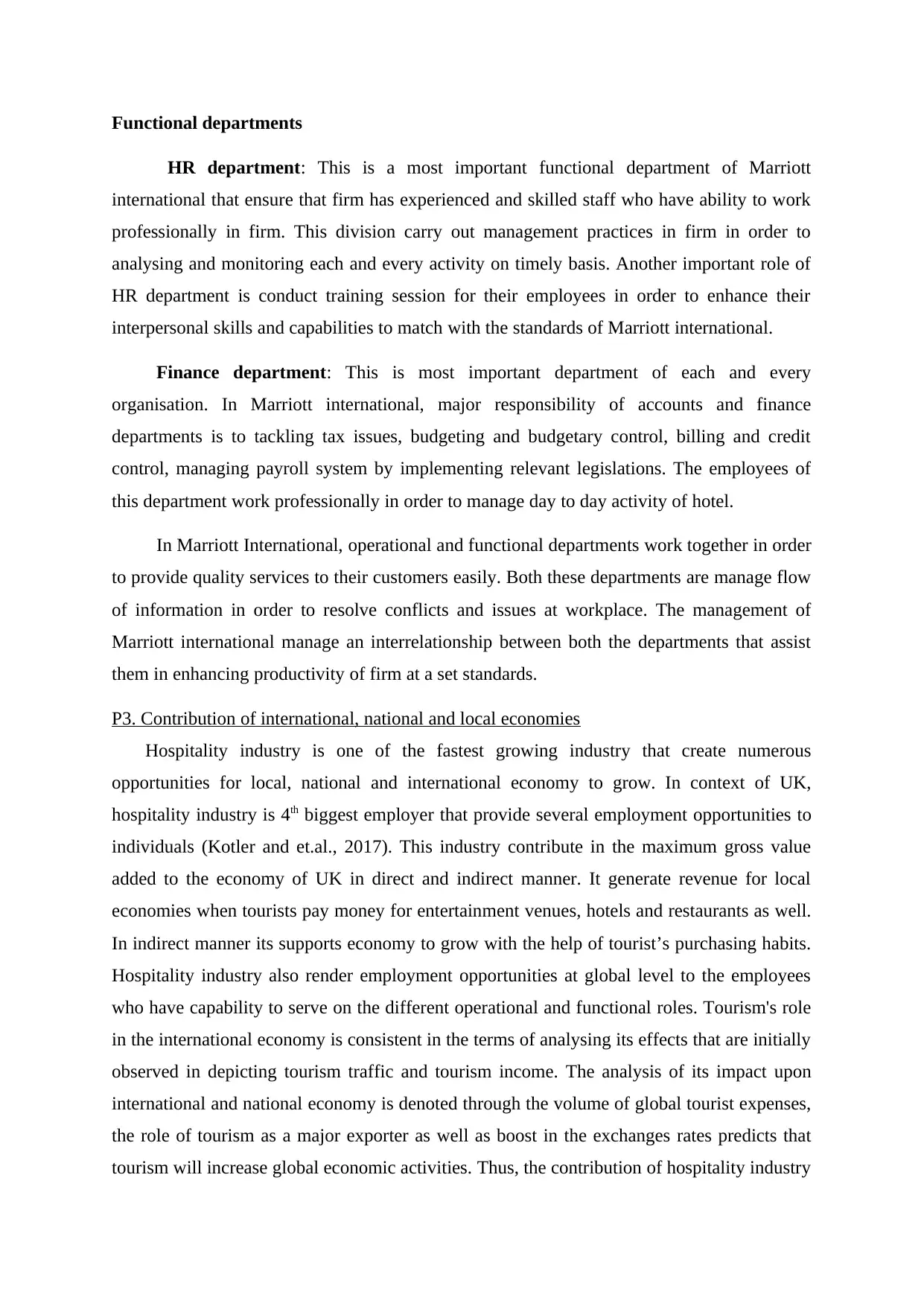
Functional departments
HR department: This is a most important functional department of Marriott
international that ensure that firm has experienced and skilled staff who have ability to work
professionally in firm. This division carry out management practices in firm in order to
analysing and monitoring each and every activity on timely basis. Another important role of
HR department is conduct training session for their employees in order to enhance their
interpersonal skills and capabilities to match with the standards of Marriott international.
Finance department: This is most important department of each and every
organisation. In Marriott international, major responsibility of accounts and finance
departments is to tackling tax issues, budgeting and budgetary control, billing and credit
control, managing payroll system by implementing relevant legislations. The employees of
this department work professionally in order to manage day to day activity of hotel.
In Marriott International, operational and functional departments work together in order
to provide quality services to their customers easily. Both these departments are manage flow
of information in order to resolve conflicts and issues at workplace. The management of
Marriott international manage an interrelationship between both the departments that assist
them in enhancing productivity of firm at a set standards.
P3. Contribution of international, national and local economies
Hospitality industry is one of the fastest growing industry that create numerous
opportunities for local, national and international economy to grow. In context of UK,
hospitality industry is 4th biggest employer that provide several employment opportunities to
individuals (Kotler and et.al., 2017). This industry contribute in the maximum gross value
added to the economy of UK in direct and indirect manner. It generate revenue for local
economies when tourists pay money for entertainment venues, hotels and restaurants as well.
In indirect manner its supports economy to grow with the help of tourist’s purchasing habits.
Hospitality industry also render employment opportunities at global level to the employees
who have capability to serve on the different operational and functional roles. Tourism's role
in the international economy is consistent in the terms of analysing its effects that are initially
observed in depicting tourism traffic and tourism income. The analysis of its impact upon
international and national economy is denoted through the volume of global tourist expenses,
the role of tourism as a major exporter as well as boost in the exchanges rates predicts that
tourism will increase global economic activities. Thus, the contribution of hospitality industry
HR department: This is a most important functional department of Marriott
international that ensure that firm has experienced and skilled staff who have ability to work
professionally in firm. This division carry out management practices in firm in order to
analysing and monitoring each and every activity on timely basis. Another important role of
HR department is conduct training session for their employees in order to enhance their
interpersonal skills and capabilities to match with the standards of Marriott international.
Finance department: This is most important department of each and every
organisation. In Marriott international, major responsibility of accounts and finance
departments is to tackling tax issues, budgeting and budgetary control, billing and credit
control, managing payroll system by implementing relevant legislations. The employees of
this department work professionally in order to manage day to day activity of hotel.
In Marriott International, operational and functional departments work together in order
to provide quality services to their customers easily. Both these departments are manage flow
of information in order to resolve conflicts and issues at workplace. The management of
Marriott international manage an interrelationship between both the departments that assist
them in enhancing productivity of firm at a set standards.
P3. Contribution of international, national and local economies
Hospitality industry is one of the fastest growing industry that create numerous
opportunities for local, national and international economy to grow. In context of UK,
hospitality industry is 4th biggest employer that provide several employment opportunities to
individuals (Kotler and et.al., 2017). This industry contribute in the maximum gross value
added to the economy of UK in direct and indirect manner. It generate revenue for local
economies when tourists pay money for entertainment venues, hotels and restaurants as well.
In indirect manner its supports economy to grow with the help of tourist’s purchasing habits.
Hospitality industry also render employment opportunities at global level to the employees
who have capability to serve on the different operational and functional roles. Tourism's role
in the international economy is consistent in the terms of analysing its effects that are initially
observed in depicting tourism traffic and tourism income. The analysis of its impact upon
international and national economy is denoted through the volume of global tourist expenses,
the role of tourism as a major exporter as well as boost in the exchanges rates predicts that
tourism will increase global economic activities. Thus, the contribution of hospitality industry
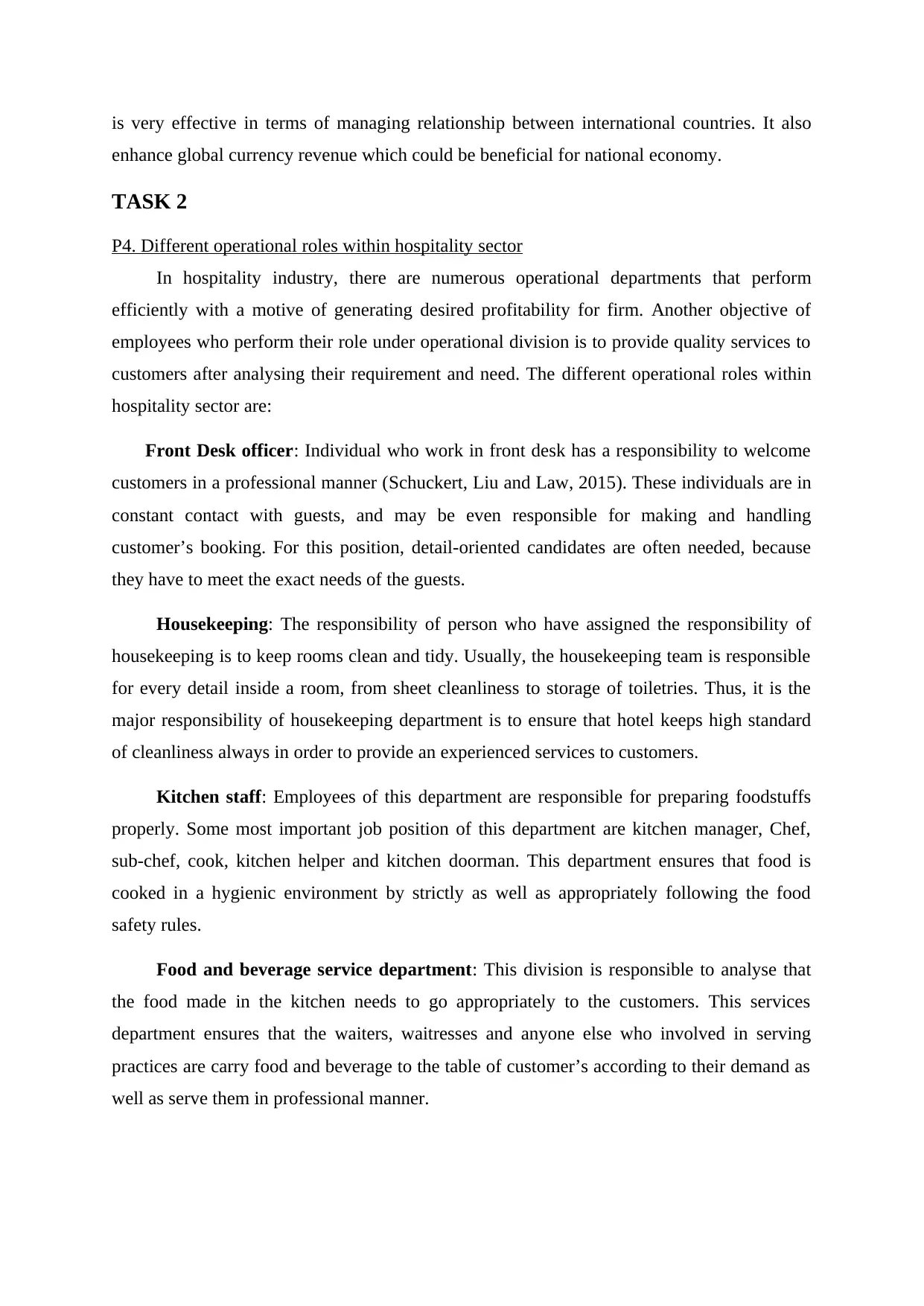
is very effective in terms of managing relationship between international countries. It also
enhance global currency revenue which could be beneficial for national economy.
TASK 2
P4. Different operational roles within hospitality sector
In hospitality industry, there are numerous operational departments that perform
efficiently with a motive of generating desired profitability for firm. Another objective of
employees who perform their role under operational division is to provide quality services to
customers after analysing their requirement and need. The different operational roles within
hospitality sector are:
Front Desk officer: Individual who work in front desk has a responsibility to welcome
customers in a professional manner (Schuckert, Liu and Law, 2015). These individuals are in
constant contact with guests, and may be even responsible for making and handling
customer’s booking. For this position, detail-oriented candidates are often needed, because
they have to meet the exact needs of the guests.
Housekeeping: The responsibility of person who have assigned the responsibility of
housekeeping is to keep rooms clean and tidy. Usually, the housekeeping team is responsible
for every detail inside a room, from sheet cleanliness to storage of toiletries. Thus, it is the
major responsibility of housekeeping department is to ensure that hotel keeps high standard
of cleanliness always in order to provide an experienced services to customers.
Kitchen staff: Employees of this department are responsible for preparing foodstuffs
properly. Some most important job position of this department are kitchen manager, Chef,
sub-chef, cook, kitchen helper and kitchen doorman. This department ensures that food is
cooked in a hygienic environment by strictly as well as appropriately following the food
safety rules.
Food and beverage service department: This division is responsible to analyse that
the food made in the kitchen needs to go appropriately to the customers. This services
department ensures that the waiters, waitresses and anyone else who involved in serving
practices are carry food and beverage to the table of customer’s according to their demand as
well as serve them in professional manner.
enhance global currency revenue which could be beneficial for national economy.
TASK 2
P4. Different operational roles within hospitality sector
In hospitality industry, there are numerous operational departments that perform
efficiently with a motive of generating desired profitability for firm. Another objective of
employees who perform their role under operational division is to provide quality services to
customers after analysing their requirement and need. The different operational roles within
hospitality sector are:
Front Desk officer: Individual who work in front desk has a responsibility to welcome
customers in a professional manner (Schuckert, Liu and Law, 2015). These individuals are in
constant contact with guests, and may be even responsible for making and handling
customer’s booking. For this position, detail-oriented candidates are often needed, because
they have to meet the exact needs of the guests.
Housekeeping: The responsibility of person who have assigned the responsibility of
housekeeping is to keep rooms clean and tidy. Usually, the housekeeping team is responsible
for every detail inside a room, from sheet cleanliness to storage of toiletries. Thus, it is the
major responsibility of housekeeping department is to ensure that hotel keeps high standard
of cleanliness always in order to provide an experienced services to customers.
Kitchen staff: Employees of this department are responsible for preparing foodstuffs
properly. Some most important job position of this department are kitchen manager, Chef,
sub-chef, cook, kitchen helper and kitchen doorman. This department ensures that food is
cooked in a hygienic environment by strictly as well as appropriately following the food
safety rules.
Food and beverage service department: This division is responsible to analyse that
the food made in the kitchen needs to go appropriately to the customers. This services
department ensures that the waiters, waitresses and anyone else who involved in serving
practices are carry food and beverage to the table of customer’s according to their demand as
well as serve them in professional manner.
⊘ This is a preview!⊘
Do you want full access?
Subscribe today to unlock all pages.

Trusted by 1+ million students worldwide
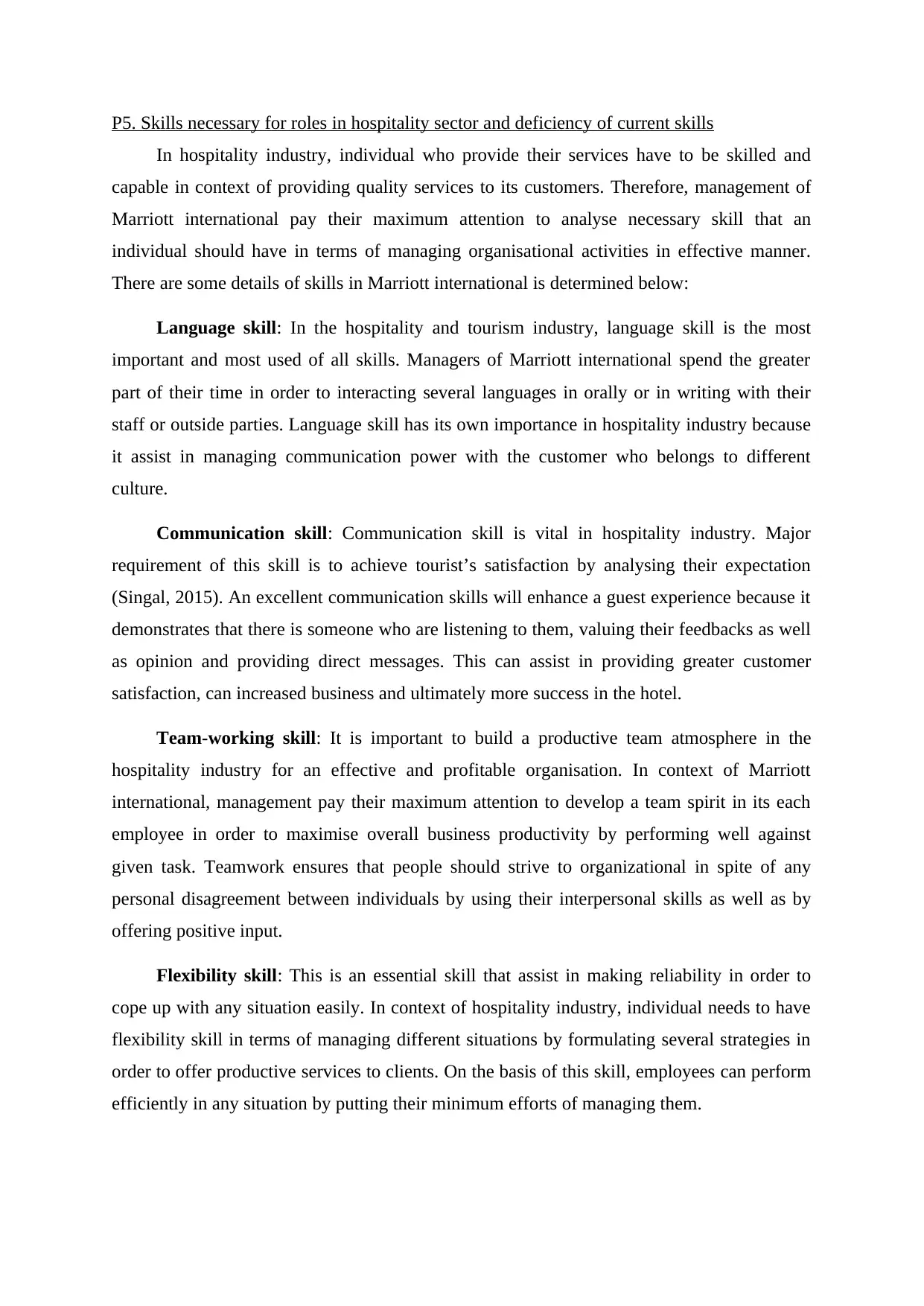
P5. Skills necessary for roles in hospitality sector and deficiency of current skills
In hospitality industry, individual who provide their services have to be skilled and
capable in context of providing quality services to its customers. Therefore, management of
Marriott international pay their maximum attention to analyse necessary skill that an
individual should have in terms of managing organisational activities in effective manner.
There are some details of skills in Marriott international is determined below:
Language skill: In the hospitality and tourism industry, language skill is the most
important and most used of all skills. Managers of Marriott international spend the greater
part of their time in order to interacting several languages in orally or in writing with their
staff or outside parties. Language skill has its own importance in hospitality industry because
it assist in managing communication power with the customer who belongs to different
culture.
Communication skill: Communication skill is vital in hospitality industry. Major
requirement of this skill is to achieve tourist’s satisfaction by analysing their expectation
(Singal, 2015). An excellent communication skills will enhance a guest experience because it
demonstrates that there is someone who are listening to them, valuing their feedbacks as well
as opinion and providing direct messages. This can assist in providing greater customer
satisfaction, can increased business and ultimately more success in the hotel.
Team-working skill: It is important to build a productive team atmosphere in the
hospitality industry for an effective and profitable organisation. In context of Marriott
international, management pay their maximum attention to develop a team spirit in its each
employee in order to maximise overall business productivity by performing well against
given task. Teamwork ensures that people should strive to organizational in spite of any
personal disagreement between individuals by using their interpersonal skills as well as by
offering positive input.
Flexibility skill: This is an essential skill that assist in making reliability in order to
cope up with any situation easily. In context of hospitality industry, individual needs to have
flexibility skill in terms of managing different situations by formulating several strategies in
order to offer productive services to clients. On the basis of this skill, employees can perform
efficiently in any situation by putting their minimum efforts of managing them.
In hospitality industry, individual who provide their services have to be skilled and
capable in context of providing quality services to its customers. Therefore, management of
Marriott international pay their maximum attention to analyse necessary skill that an
individual should have in terms of managing organisational activities in effective manner.
There are some details of skills in Marriott international is determined below:
Language skill: In the hospitality and tourism industry, language skill is the most
important and most used of all skills. Managers of Marriott international spend the greater
part of their time in order to interacting several languages in orally or in writing with their
staff or outside parties. Language skill has its own importance in hospitality industry because
it assist in managing communication power with the customer who belongs to different
culture.
Communication skill: Communication skill is vital in hospitality industry. Major
requirement of this skill is to achieve tourist’s satisfaction by analysing their expectation
(Singal, 2015). An excellent communication skills will enhance a guest experience because it
demonstrates that there is someone who are listening to them, valuing their feedbacks as well
as opinion and providing direct messages. This can assist in providing greater customer
satisfaction, can increased business and ultimately more success in the hotel.
Team-working skill: It is important to build a productive team atmosphere in the
hospitality industry for an effective and profitable organisation. In context of Marriott
international, management pay their maximum attention to develop a team spirit in its each
employee in order to maximise overall business productivity by performing well against
given task. Teamwork ensures that people should strive to organizational in spite of any
personal disagreement between individuals by using their interpersonal skills as well as by
offering positive input.
Flexibility skill: This is an essential skill that assist in making reliability in order to
cope up with any situation easily. In context of hospitality industry, individual needs to have
flexibility skill in terms of managing different situations by formulating several strategies in
order to offer productive services to clients. On the basis of this skill, employees can perform
efficiently in any situation by putting their minimum efforts of managing them.
Paraphrase This Document
Need a fresh take? Get an instant paraphrase of this document with our AI Paraphraser
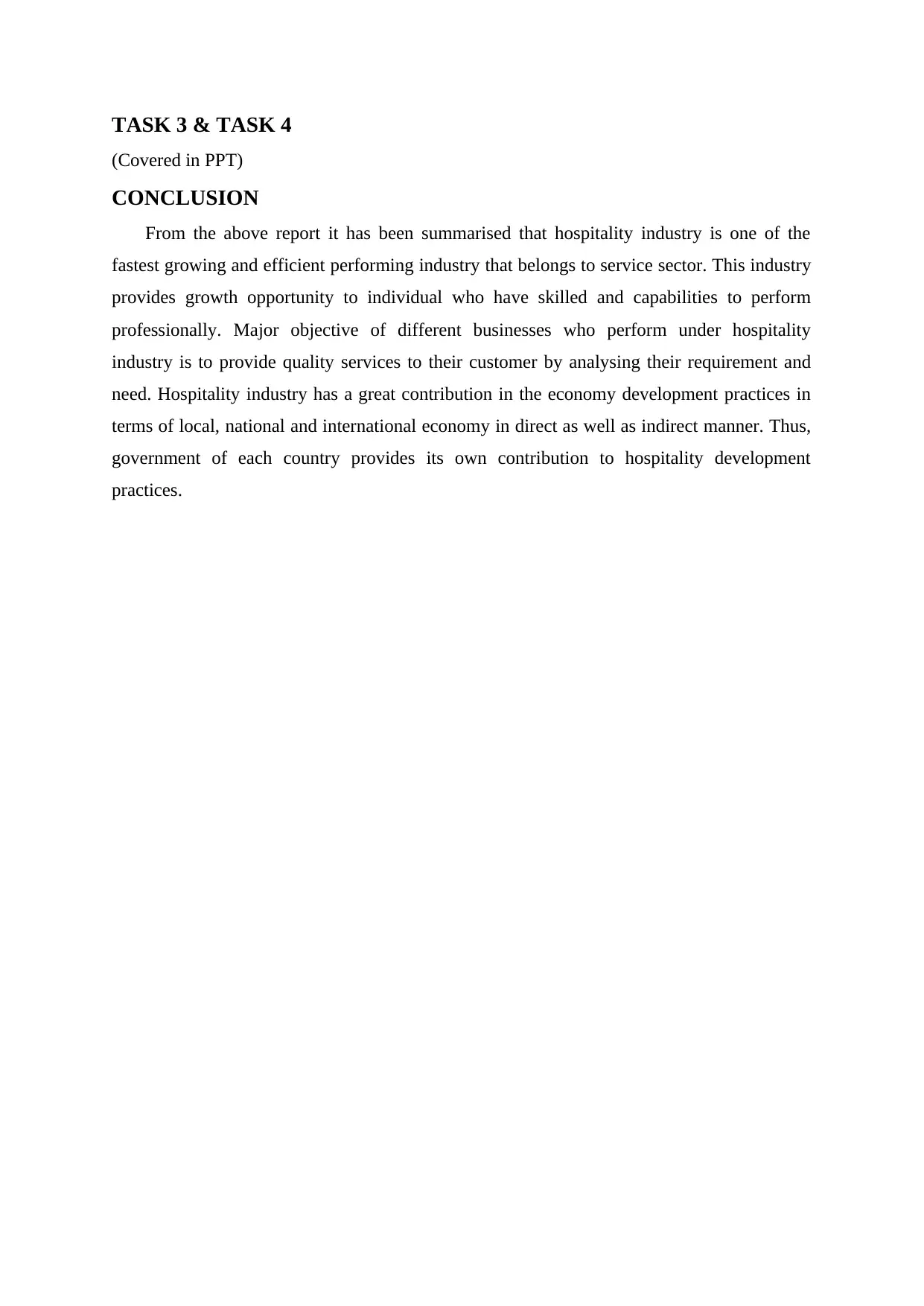
TASK 3 & TASK 4
(Covered in PPT)
CONCLUSION
From the above report it has been summarised that hospitality industry is one of the
fastest growing and efficient performing industry that belongs to service sector. This industry
provides growth opportunity to individual who have skilled and capabilities to perform
professionally. Major objective of different businesses who perform under hospitality
industry is to provide quality services to their customer by analysing their requirement and
need. Hospitality industry has a great contribution in the economy development practices in
terms of local, national and international economy in direct as well as indirect manner. Thus,
government of each country provides its own contribution to hospitality development
practices.
(Covered in PPT)
CONCLUSION
From the above report it has been summarised that hospitality industry is one of the
fastest growing and efficient performing industry that belongs to service sector. This industry
provides growth opportunity to individual who have skilled and capabilities to perform
professionally. Major objective of different businesses who perform under hospitality
industry is to provide quality services to their customer by analysing their requirement and
need. Hospitality industry has a great contribution in the economy development practices in
terms of local, national and international economy in direct as well as indirect manner. Thus,
government of each country provides its own contribution to hospitality development
practices.
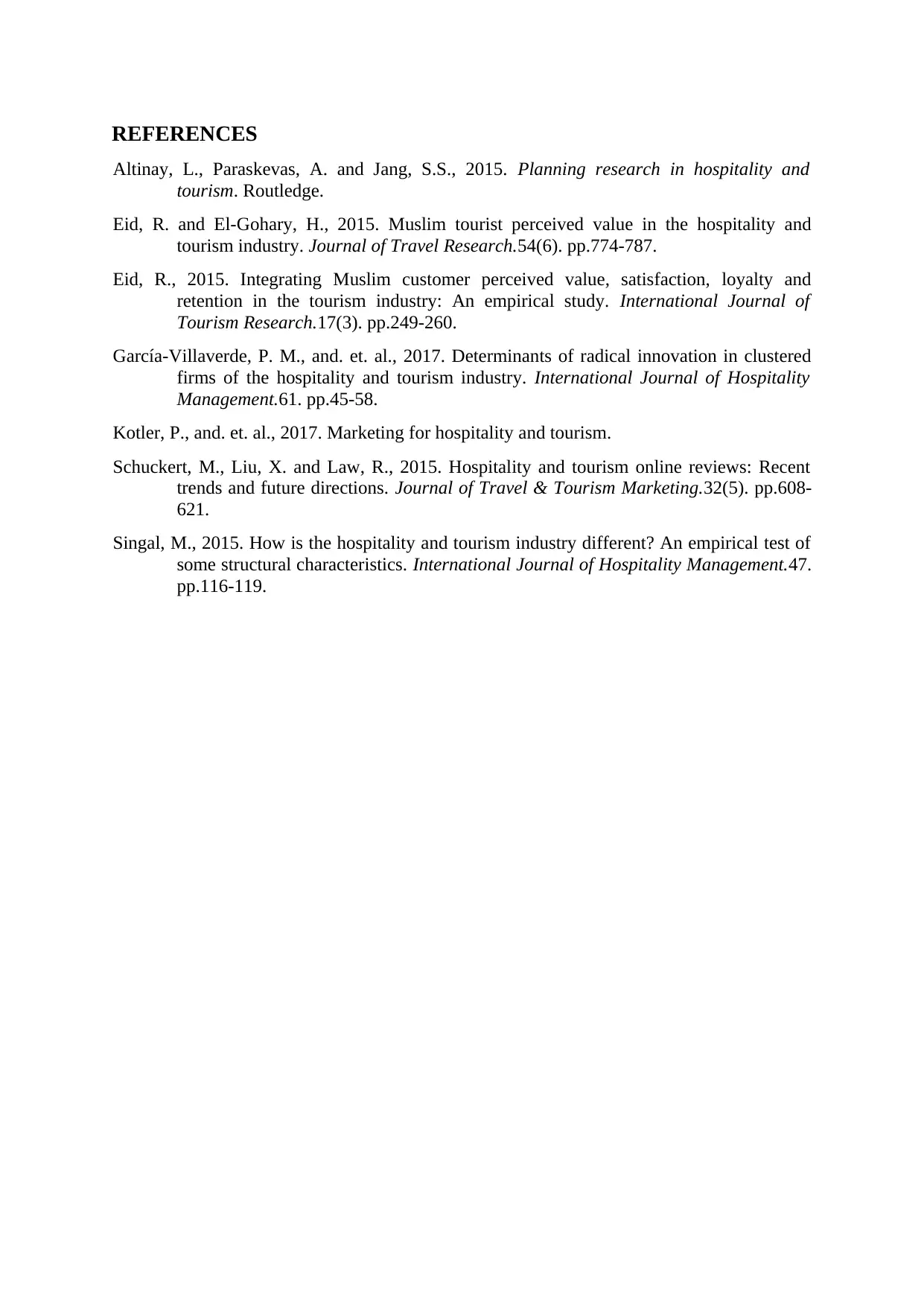
REFERENCES
Altinay, L., Paraskevas, A. and Jang, S.S., 2015. Planning research in hospitality and
tourism. Routledge.
Eid, R. and El-Gohary, H., 2015. Muslim tourist perceived value in the hospitality and
tourism industry. Journal of Travel Research.54(6). pp.774-787.
Eid, R., 2015. Integrating Muslim customer perceived value, satisfaction, loyalty and
retention in the tourism industry: An empirical study. International Journal of
Tourism Research.17(3). pp.249-260.
García-Villaverde, P. M., and. et. al., 2017. Determinants of radical innovation in clustered
firms of the hospitality and tourism industry. International Journal of Hospitality
Management.61. pp.45-58.
Kotler, P., and. et. al., 2017. Marketing for hospitality and tourism.
Schuckert, M., Liu, X. and Law, R., 2015. Hospitality and tourism online reviews: Recent
trends and future directions. Journal of Travel & Tourism Marketing.32(5). pp.608-
621.
Singal, M., 2015. How is the hospitality and tourism industry different? An empirical test of
some structural characteristics. International Journal of Hospitality Management.47.
pp.116-119.
Altinay, L., Paraskevas, A. and Jang, S.S., 2015. Planning research in hospitality and
tourism. Routledge.
Eid, R. and El-Gohary, H., 2015. Muslim tourist perceived value in the hospitality and
tourism industry. Journal of Travel Research.54(6). pp.774-787.
Eid, R., 2015. Integrating Muslim customer perceived value, satisfaction, loyalty and
retention in the tourism industry: An empirical study. International Journal of
Tourism Research.17(3). pp.249-260.
García-Villaverde, P. M., and. et. al., 2017. Determinants of radical innovation in clustered
firms of the hospitality and tourism industry. International Journal of Hospitality
Management.61. pp.45-58.
Kotler, P., and. et. al., 2017. Marketing for hospitality and tourism.
Schuckert, M., Liu, X. and Law, R., 2015. Hospitality and tourism online reviews: Recent
trends and future directions. Journal of Travel & Tourism Marketing.32(5). pp.608-
621.
Singal, M., 2015. How is the hospitality and tourism industry different? An empirical test of
some structural characteristics. International Journal of Hospitality Management.47.
pp.116-119.
⊘ This is a preview!⊘
Do you want full access?
Subscribe today to unlock all pages.

Trusted by 1+ million students worldwide
1 out of 9
Related Documents
Your All-in-One AI-Powered Toolkit for Academic Success.
+13062052269
info@desklib.com
Available 24*7 on WhatsApp / Email
![[object Object]](/_next/static/media/star-bottom.7253800d.svg)
Unlock your academic potential
Copyright © 2020–2026 A2Z Services. All Rights Reserved. Developed and managed by ZUCOL.





